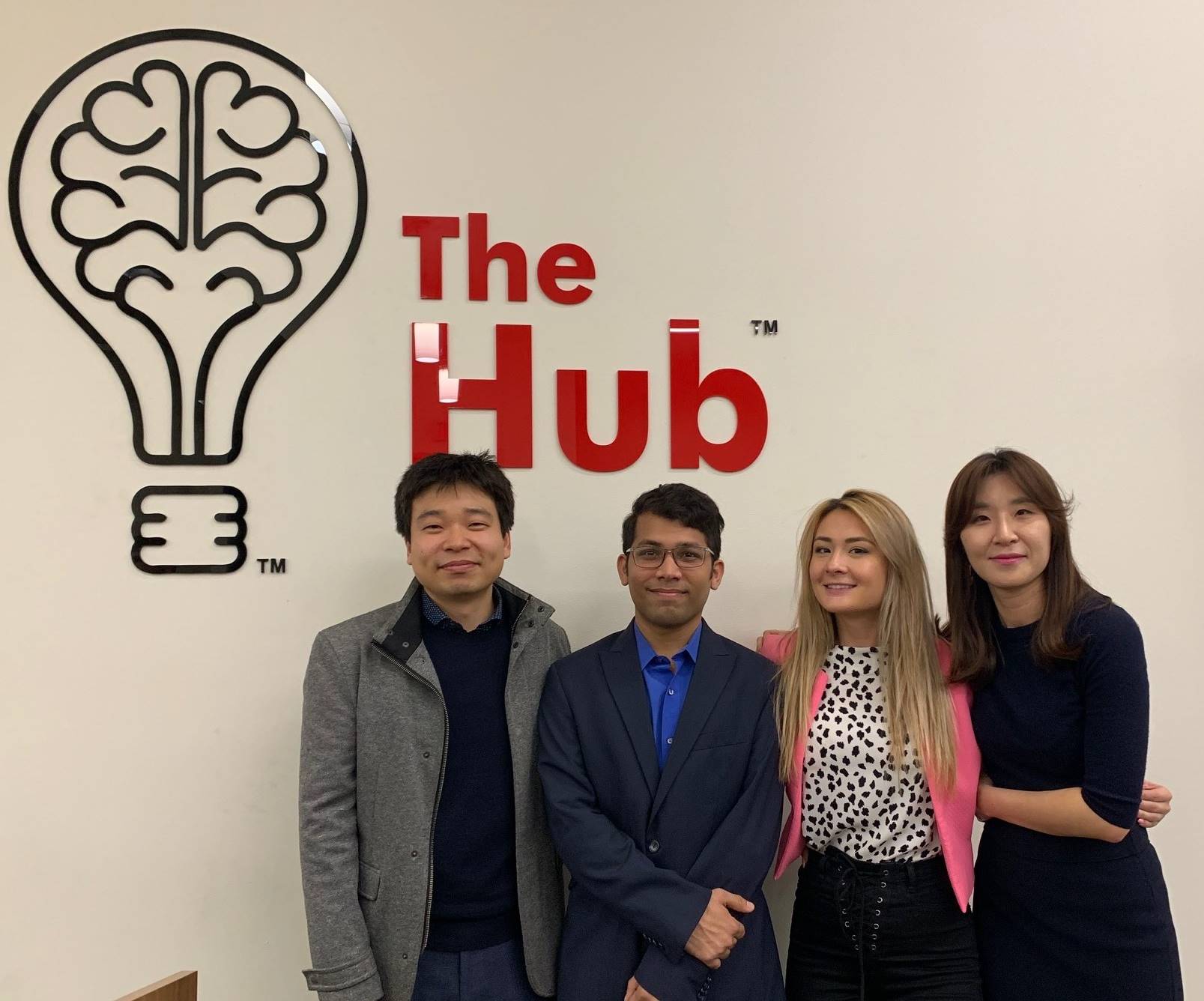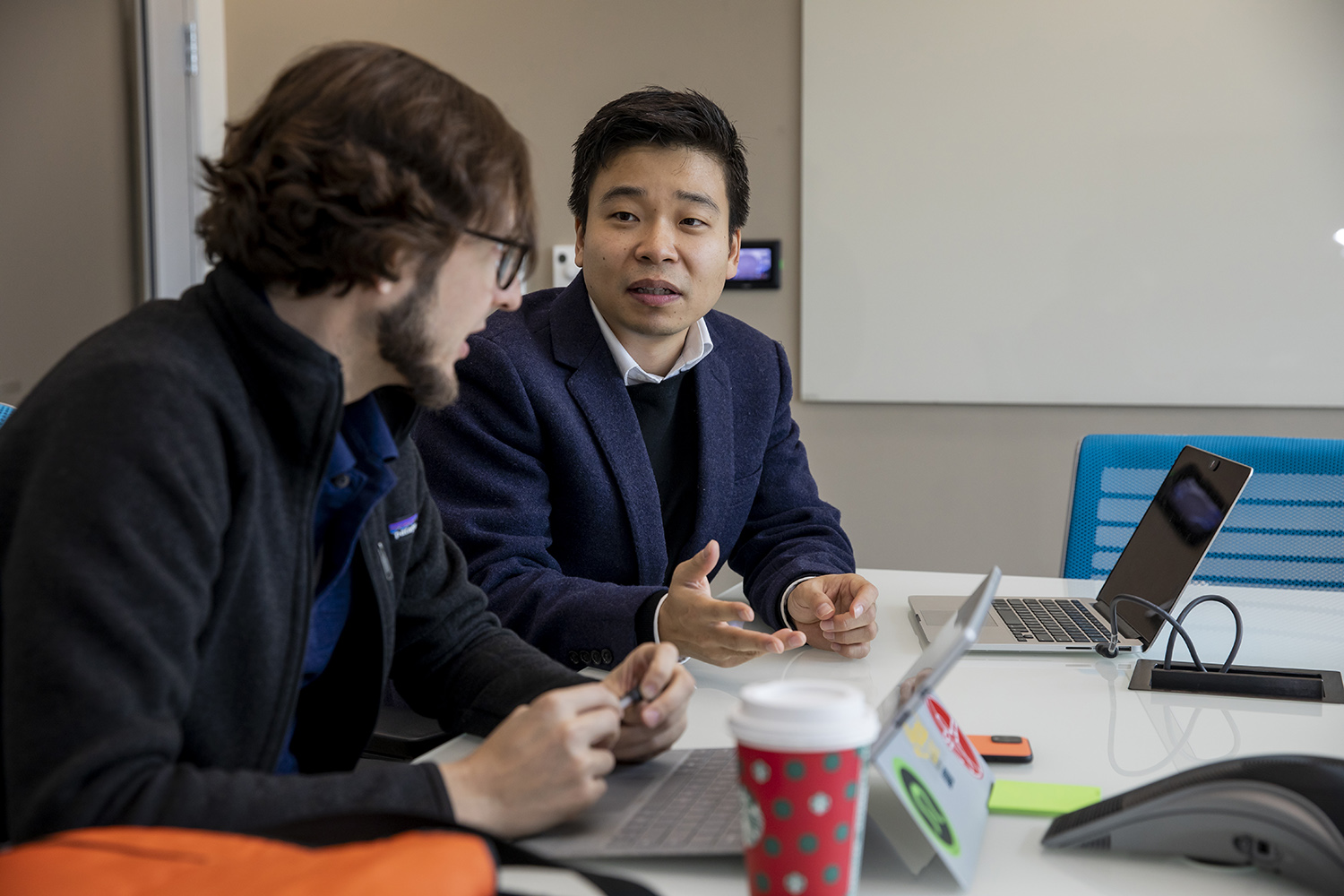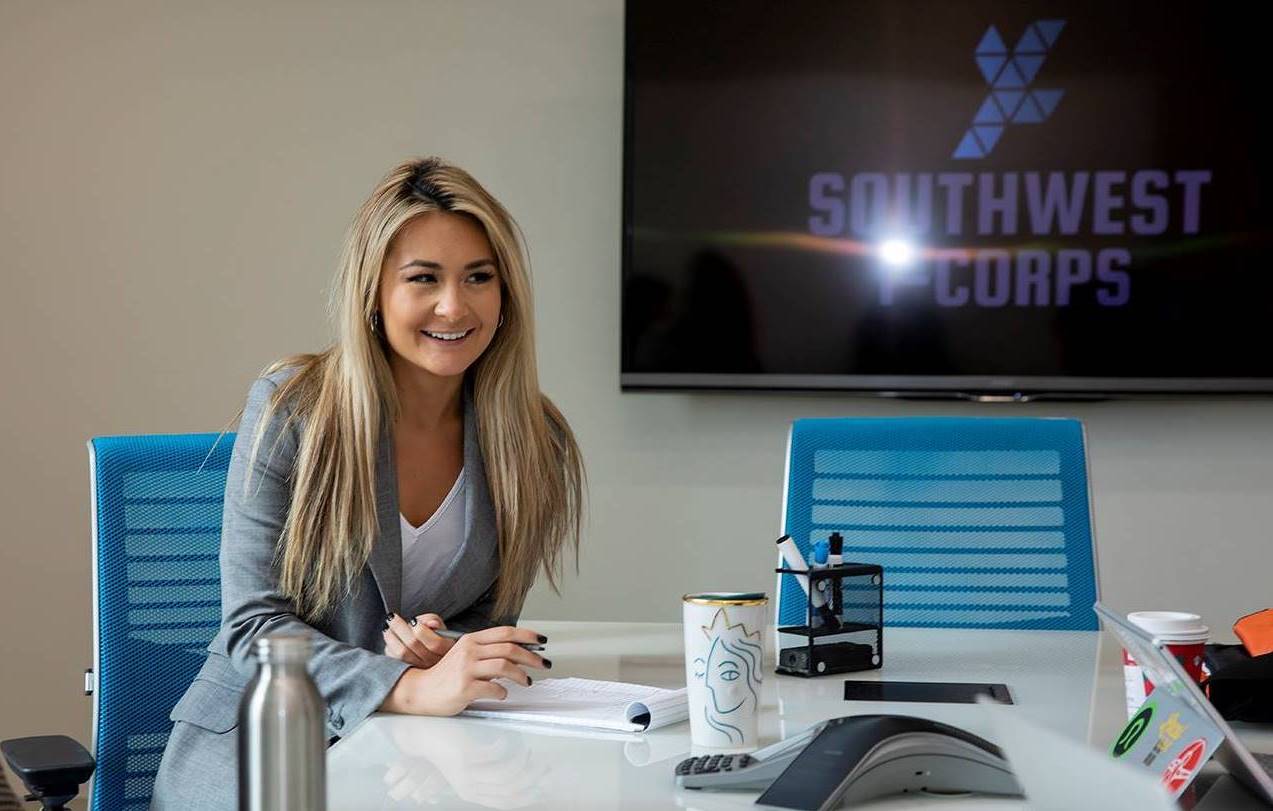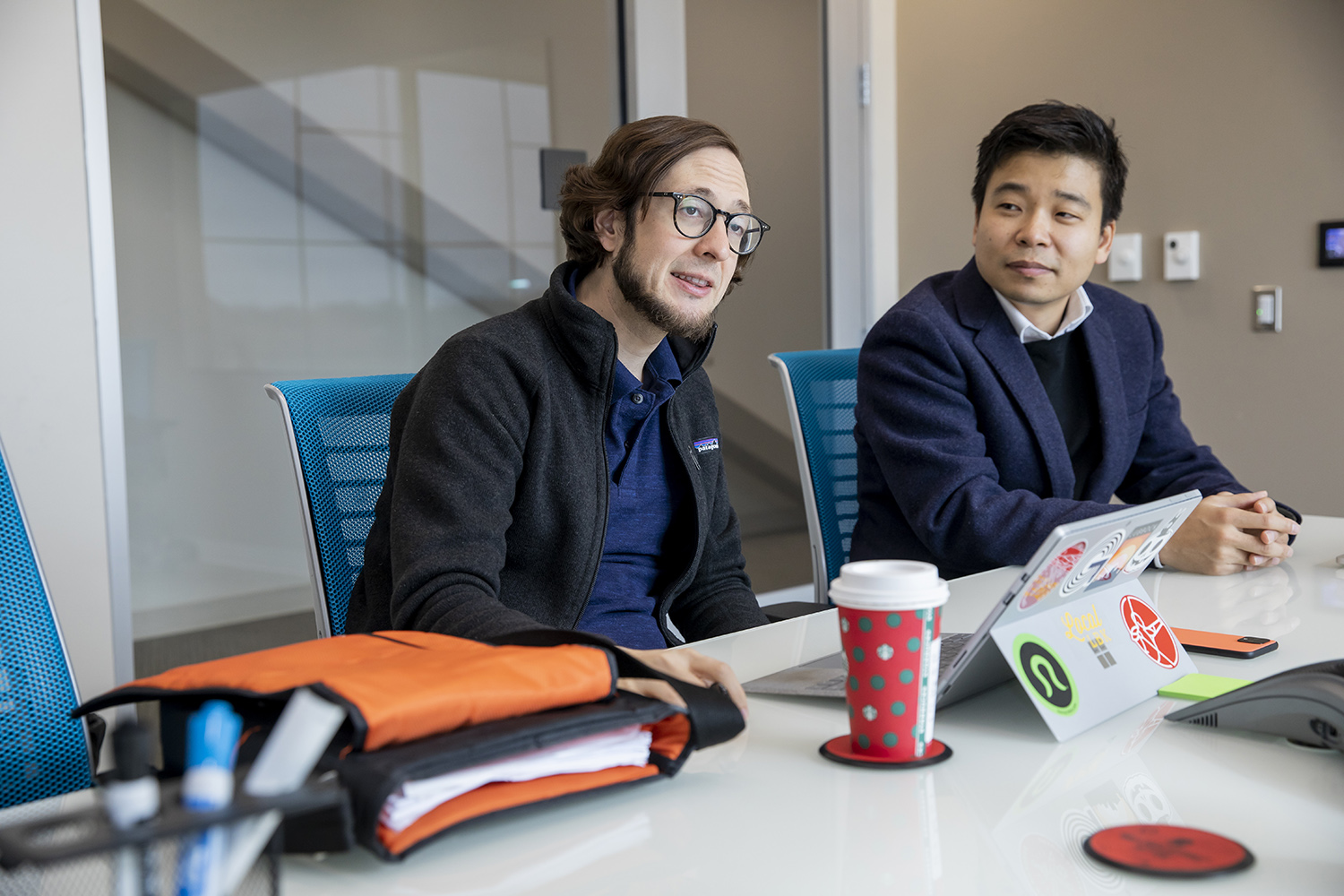Hub programs help unique research collaboration find its perfect fit
Shopping for clothes online can be convenient, but buying all the items in your shopping cart can be a mixed bag.
On one hand, there are often more options online than in brick-and-mortar stores, meaning a wider variety of styles and sizes from which to choose.
On the other hand, buying online means not seeing the item before you buy it – no feeling the fabric, no trying it on to see if it fits well and no guarantee you'll like what you receive.
More than one-quarter of apparel sales are now made online – a number that's only going up – but factors like these have pushed returns up, too. By some estimates, 40% of all online clothing purchases are returned. While shoppers may enjoy free shipping and easy-return policies, retailers absorbing those costs don't. Within the next few years, that amount is projected to top $1 trillion annually. Companies could pass on those costs to customers, but that could lead shoppers to take their money elsewhere.
But what if there was a better way? What if there was a way for retailers to offer their customers the convenience and selection of online shopping without absorbing the costs or passing them on to customers?
That's the idea of a group of Texas Tech University researchers. With support from the Innovation Hub at Research Park and a first-of-its-kind National Science Foundation (NSF) grant, their solution may soon be a reality.
Smart Mirror app
Jo Woon Chong, an assistant professor in the Department of Electrical & Computer Engineering, specializes in modeling physiological systems and noninvasive physiological monitoring. No stranger to innovative technologies, Chong has developed a way to diagnose eye diseases using an iPhone and a smartphone app that can detect heartbeat irregularities.
Hyo Jung (Julie) Chang, an associate professor of Hospitality & Retail Management, specializes in consumer behavior, retail strategy and retail environment. Her research program focuses primarily on the therapeutic effects of dress for various consumer groups and the psychological well-being of consumers.
Their research areas are miles apart, but for this specific purpose, they're the perfect fit.
Back in 2018, Chang and her undergraduate research assistant Francine Bruess were looking into smart mirror technology. Their idea was to create large mirrors for store dressing rooms that could scan a customer's body and consider their past purchase history to optimize their fit, as well as serve as a liaison between sales associates and customers. When the pair began discussing commercialization opportunities for the idea through the Innovation Hub, Chang reached out to Chong, who she knew had previous experience.
But while examining the industry's need for such a mirror, they found that online shopping, rather than in-store, held greater potential. And because nearly two-thirds of Americans already own a smartphone, they decided it made more sense to create an application than to try to develop an entirely new device.
"They came together and formed a team to create the Smart Mirror app that would help people do online shopping," said Weston Waldo, commercialization program director for the Innovation Hub. "Essentially, people would be able to try on the shirt or the dress before they actually purchase it."
Chong explains that the current iPhone model, the iPhone 11 Pro Max, includes a depth camera that can be used to create 3D images and estimate the size of an object quite accurately. The app would capitalize on this technology, using it to take a picture of a person's body, then connect to the sizing information of the garment a customer is looking at and determine how well the garment would fit that person.
But the app, currently in the proof-of-concept phase, goes farther than simply matching the measurements of a person with the measurements of a clothing item. It also can use the smartphone's sensors to detect personalized information about the user, such as body temperature, that can affect clothing preferences. This innovative smartphone-based interactive mirror provides a personalized merchandise selection with the optimal fit and physiological responses for the selections.
"Online stores give you the measurements and everything, but we use artificial intelligence and machine learning, and we take into account your past purchase history, your physiological signs, and your actual measurements to say, 'This sweater has this much of a chest width, but based on your past purchase history, you don't like them to fit the way the model likes it to fit,' so it's very customized to what you're actually going to want to keep," said Bruess, the team's entrepreneurial lead and now a graduate research assistant in hospitality and retail management. "That way, when you receive the item, you're actually going to want to wear it – it's not just matched in theory but not really what you want. This solves a deeper issue."
Chang, who is particularly interested in customers' psychological well-being and confidence, says these features can provide a better solution to make customers more satisfied with their purchase.
"It's about finding clothing that's a good fit, but not just physically," Bruess emphasized. "There are physiological and psychological things behind what makes you feel comfortable in a piece of clothing, and we're focusing on all of them."
I-Corps
While the concept is intriguing, the idea must be realized to have a real-world impact. So, working with the Innovation Hub, the team entered the NSF's I-Corps program. Within the Innovation Hub, they found a mentor who could help guide them through the process.
Dr. Nicholas Bergfeld, a research associate in the Jerry S. Rawls College of Business, had previously served as the industry mentor for a different I-Corps National team and was recommended to the Smart Mirror team as a good fit due to his expertise in private equity.
"The I-Corps process is a rigorous and immersive experience for teaching a well-regarded commercialization framework called Business Model Canvas," Bergfeld said. "The major value comes from active engagement and exposing yourself to real-world potential customers."
As Waldo explains, there was a growing concern nationwide some years ago that billions of taxpayer dollars were being funneled into research, and nothing was coming out of those efforts. As a result, Congress wanted the NSF to show its return on investment. In response, the NSF developed I-Corps.
As a two-step program, I-Corps can show an anticipated return without a huge initial investment. At the regional level, teams get three weeks and a $3,000 grant to conduct 25 customer interviews showing the potential impact of their idea on an industry.
Kamrul Foysal, a doctoral student of Dr. Chong's, was also part of the group's regional I-Corps team and remains involved with the startup project.

"Regionals was a really good starting point for us because we'd never heard of a lot of the terminology they use or how to even think with a business mindset," Bruess said. "They taught us to look at the product-market fit and who is the customer. They really stressed for us to not focus on what we think but to actually go out there and discover and research what's the actual need, and I think that helped a lot."
Through the course of the 55 interviews they completed, the Smart Mirror team adapted and refined their idea into its current form.
"We started with small retailers here in Lubbock, and we interviewed a few customers," Chang said, "but we want to release it for people who can really support all of this technology."
"We were focusing on the end consumer, which is the customer, but we also were really focused on our customer, which is going to be the owners and people who actually can buy the technology and implement it," Bruess added. "We went to one of the Harvard Business School conferences, and we got to talk to a lot of executives and owners for small businesses and online retail owners. That was really helpful, and that also was kind of a change for us. We thought we were going to focus on small, high-end stores, and then once we went to a few interviews, we realized our market's actually out there somewhere else."
National I-Corps
After succeeding at the regional level, the Smart Mirror team has now advanced to the national I-Corps program. Foysal is traveling with the group, although he cannot be part of the actual national team due to the program's limit on the size of each team.
In the national I-Corps program, Smart Mirror has seven weeks and a $50,000 grant to do an additional 100 interviews.
Each week focuses on a topic, interviewing potential customers or saboteurs – those already in the market who might want to keep the team's business out – to examine competitors as well as possible opportunities for buyouts or mergers. It began the last week of January and will run through the second week of March.
"The content and curriculum of the program happens very quickly," Bergfeld said. "The most challenging part is making sure there's time for the learnings to be incorporated into sustained skills. Ultimately, it's about what's retained after the program is over."
At the end of the seven weeks, the NSF makes a recommendation to the team. It could suggest the idea is not ready for the market and more research is needed, or it could return a "Go" decision, encouraging the team to form a company and commercialize the idea.
"Hopefully, after seven weeks, we will have a 'Go' decision from them," Chong said.
Then come other challenges. For instance, with his smartphone detection of arrhythmia, Chong had to seek approval from the Food & Drug Administration (FDA). Whether other certifications or approvals will be needed for the Smart Mirror app remains to be seen, but Chong hopes the technology can be live within the next two years.
"I think we're just really trying to use this seven-week period as a good preparation time and a learning experience," Bruess said. "After that, hopefully it will be a 'Go' decision and we can really start working on it. There are lots of things we have to go through, but I think as soon as possible, we're trying to get it to market."
Unique opportunity
Of course, the team's prospects in I-Corps weren't always obvious.
"When I first met them, I just thought, 'There's no way this could be a National Science Foundation project,' because it's not deep technology," Waldo said. "We've never had someone funded from a non-engineering, hard-sciences department, but I thought it was just such a cool story of her consumer-science background with his, coming together to create this novel technology. One without the other would never have been possible, and there's definitely a hard-science component to it."
Lo and behold, the NSF agreed.
"The National Science Foundation really loved the idea," Waldo said. "They love the collaboration between it, so they funded it."
That rare distinction helps researchers outside the traditional sciences, like the Smart Mirror team, get the opportunity to prove themselves.
The award is a first in several ways. For one, it's the first NSF award ever received by the Department of Hospitality & Retail Management.
"The expertise within the team is very unique, especially for I-Corps, where the expertise tends to be in more traditionally viewed sciences," Bergfeld said. "This team is the first I'm aware of with a strong consumer sciences orientation, both with the entrepreneurial lead and co-lead principal investigator."
That's not by accident.
The universities that participate in the I-Corps program on a national scale are divided into two categories: sites and nodes.
I-Corps sites are academic institutions that can form I-Corps teams. They provide infrastructure, advice, resources, networking opportunities, training and modest funding to enable groups to transition their work into the marketplace or into becoming I-Corps program applicants. There are approximately 100 active sites around the country.
I-Corps nodes are academic institutions that specialize in teaching entrepreneurship through the I-Corps curriculum, while also supporting regional needs for innovation education, infrastructure and research.
Each of the nine geographic regions around the country has multiple sites and at least one node. Only 14 institutions serve as both a site and a node. Texas Tech is one, alongside Johns Hopkins University, the Massachusetts Institute of Technology and Cornell University, to name a few.
This means researchers at Texas Tech are likely to get more funding, Waldo explained. The university is seen as a proving ground for new ideas because of the strength of its research.
He believes that's one reason the Smart Mirror team was given this opportunity – it's a test, of sorts, to see whether collaborations outside the traditional sciences can prove profitable.
If the collaboration works, Waldo said, NSF could choose to expand its offerings in the future.
There's certainly pressure on their shoulders to succeed, the team admits, but they're eager to prove they can.
"Knowledge economy companies come from the blending of two or more research domains in novel ways," Bergfeld said. "With all the deep expertise available at Texas Tech, we'll see a lot more of these collaborations if we continue to create a nurturing entrepreneurial environment.
"I think the NSF's teaching team is really going to enjoy this group and their diligence in going through the program's stages. On the university level, the pressure is to show departments that typically don't receive a high level of commercialization engagement that their ideas deserve consideration and the university's entrepreneurship programming isn't limited to traditional, translational research projects. I'd love to see this effort result in many more transdisciplinary entrepreneurship teams, whether that be for the NSF's I-Corps or through university programming at the Innovation Hub."





